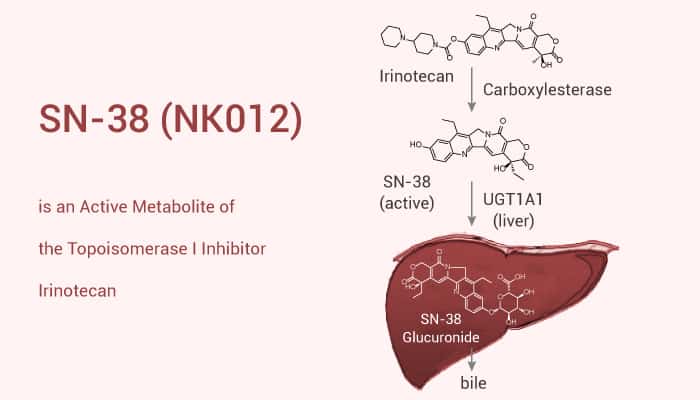DNA topoisomerase I (Top1) is a DNA unwinding protein and the specific target of the camptothecin class of chemotherapeutic drugs. Top1 binds supercoiled DNA, nicks a DNA strand allowing its rotation around the intact strand, and then relegates the DNA. Camptothecins bind and stabilize the Top1-DNA cleavage complexes, thus leading to DNA damage when replication or transcription occurs. Top1 can be examined in several different ways; gene copy number aberrations and genetic mutations, mRNA and protein expression levels, and enzyme activity levels. Irinotecan belongs to the camptothecin class of chemotherapeutic drugs. Irinotecan is a prodrug of the active metabolite SN-38. As Top1 is the direct target of SN-38, the active metabolite of irinotecan, it has been extensively studied as a possible mediator of resistance or as a predictive marker in metastatic colorectal cancer (mCRC). In addition, SN-38 inhibits the acute inflammatory response by targeting TLR4.

SN-38 possesses much stronger growth-inhibitory activity against tumor cells than Irinotecan in vitro. It also plays an important role in the antitumor effect of Irinotecan in vivo. Non-cytotoxic concentrations of SN-38 attenuated LPS (a TLR4 agonist)-driven cell activation without affecting peptidoglycan (a TLR2 agonist)-activating a response. SN-38 abrogates LPS-dependent neutrophil migration and reduced TNF-α, IL-6, and keratinocyte chemoattractant levels in the air-pouch model, but fails to inhibit zymosan (a TLR2 agonist)-induced cell migration. In a word, SN-38 inhibits acute inflammation by blocking LPS-driven TLR4 signaling.
In summary, SN-38 is an active metabolite of the Topoisomerase I inhibitor Irinotecan. SN-38 inhibits DNA and RNA synthesis. It also inhibits acute inflammation by blocking LPS-driven TLR4 signaling.
Reference:
Kawato Y, et al. Cancer Res. 1991;51(16):4187-4191.; Wong DVT, et al. Cancer Chemother Pharmacol. 2019;84(2):287-298.